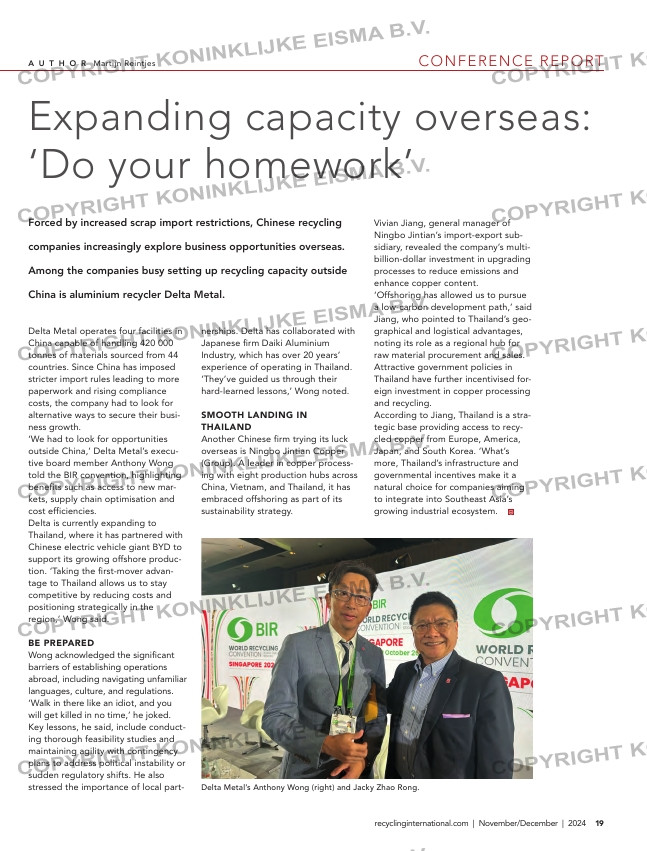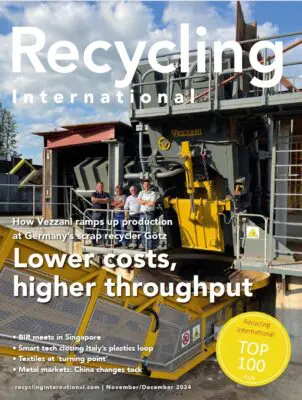Page 19 from: Recycling International November/December issue 2024

CONFERENCE REPORT
19recyclinginternational.com | November/December | 2024
recycling, warning that new restrictions
could disrupt not just India’s recycling
sector but also the wider market.
‘It’s really disheartening when devel-
oped countries impose restrictions,
citing concerns about pollution and
environmental disruption in India,’
Mehta said. He pointed at India’s
position as the world’s fastest-grow-
ing economy, arguing that unfair
restrictions would impact the global
recycling community.
LOOMING DEADLINE
Under the updated EU rules, as a
non-OECD country, India must tell the
European Commission by 21 February
2025 which specific material streams
it wishes to continue importing. For
these exports to proceed, the EU
requires materials to be handled ‘in
an environmentally sound manner’ by
Indian facilities certified through inde-
pendent audits.
Mehta expressed confidence that
India would meet these requirements,
citing 18 months of active engage-
ment between MRAI and the Indian
government. ‘We are 100% optimistic
that India will apply for scrap streams
from the EU.’
BROAD GOVERNMENT SUPPORT
Mehta praised India’s proactive posi-
tion on recycling, thanks in part to sup-
portive government policies aimed at
boosting sustainability. Initiatives
include mandatory use of recycled met-
als in new products and EPR models.
Mehta predicted that existing import
duties on non-ferrous scrap would be
eliminated by 2027, further support-
ing the industry.
Big applause at one of the plenary ses-
sions.
Delta Metal’s Anthony Wong (right) and Jacky Zhao Rong.
Expanding capacity overseas:
‘Do your homework’
Forced by increased scrap import restrictions, Chinese recycling
companies increasingly explore business opportunities overseas.
Among the companies busy setting up recycling capacity outside
China is aluminium recycler Delta Metal.
Delta Metal operates four facilities in
China capable of handling 420 000
tonnes of materials sourced from 44
countries. Since China has imposed
stricter import rules leading to more
paperwork and rising compliance
costs, the company had to look for
alternative ways to secure their busi-
ness growth.
‘We had to look for opportunities
outside China,’ Delta Metal’s execu-
tive board member Anthony Wong
told the BIR convention, highlighting
benefits such as access to new mar-
kets, supply chain optimisation and
cost efficiencies.
Delta is currently expanding to
Thailand, where it has partnered with
Chinese electric vehicle giant BYD to
support its growing offshore produc-
tion. ‘Taking the first-mover advan-
tage to Thailand allows us to stay
competitive by reducing costs and
positioning strategically in the
region,’ Wong said.
BE PREPARED
Wong acknowledged the significant
barriers of establishing operations
abroad, including navigating unfamiliar
languages, culture, and regulations.
‘Walk in there like an idiot, and you
will get killed in no time,’ he joked.
Key lessons, he said, include conduct-
ing thorough feasibility studies and
maintaining agility with contingency
plans to address political instability or
sudden regulatory shifts. He also
stressed the importance of local part-
nerships. Delta has collaborated with
Japanese firm Daiki Aluminium
Industry, which has over 20 years’
experience of operating in Thailand.
‘They’ve guided us through their
hard-learned lessons,’ Wong noted.
SMOOTH LANDING IN
THAILAND
Another Chinese firm trying its luck
overseas is Ningbo Jintian Copper
(Group). A leader in copper process-
ing with eight production hubs across
China, Vietnam, and Thailand, it has
embraced offshoring as part of its
sustainability strategy.
Vivian Jiang, general manager of
Ningbo Jintian’s import-export sub-
sidiary, revealed the company’s multi-
billion-dollar investment in upgrading
processes to reduce emissions and
enhance copper content.
‘Offshoring has allowed us to pursue
a low-carbon development path,’ said
Jiang, who pointed to Thailand’s geo-
graphical and logistical advantages,
noting its role as a regional hub for
raw material procurement and sales.
Attractive government policies in
Thailand have further incentivised for-
eign investment in copper processing
and recycling.
According to Jiang, Thailand is a stra-
tegic base providing access to recy-
cled copper from Europe, America,
Japan, and South Korea. ‘What’s
more, Thailand’s infrastructure and
governmental incentives make it a
natural choice for companies aiming
to integrate into Southeast Asia’s
growing industrial ecosystem.
A U T H O R Martijn Reintjes
14-15-16-17-18-19_birsingapore2024.indd 19 19-11-2024 11:53



